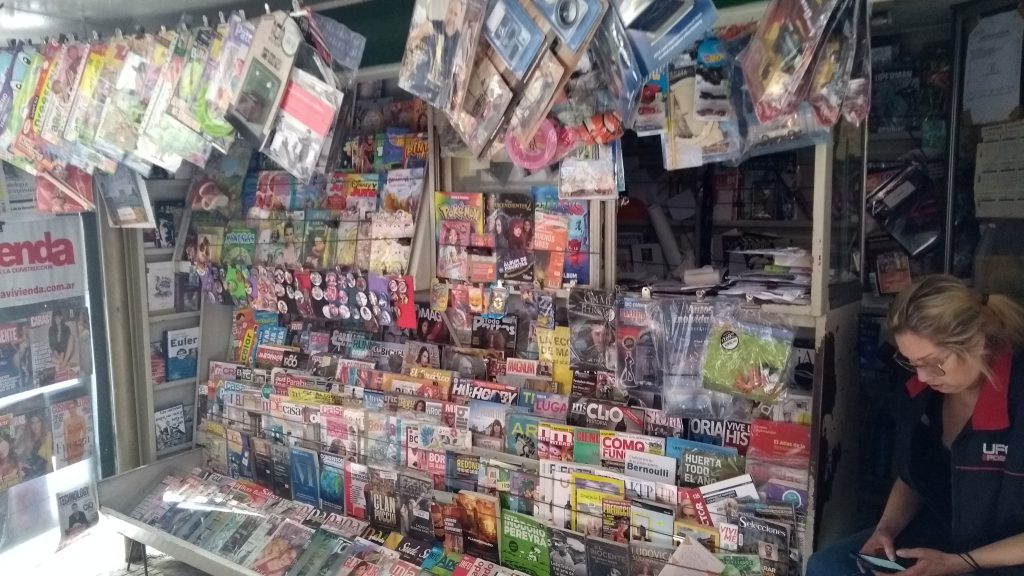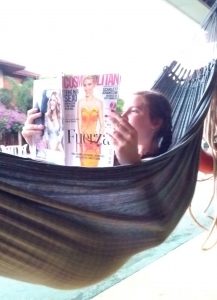I decided I wanted to be a writer when I was 11 years old once I realized the pop star life wasn’t for me. Since then I’ve changed genres a few times, switching from future fantasy novelist to fiction short story writer to firmly grounded in the realm of non-fiction.
I’m majoring in Professional Writing with a Journalism Specialization and a Foreign Language minor. My primary language for my minor is Spanish, and I’ll be picking up a secondary when I return to the States for my senior year.
 |
| The two major newspapers of Argentina are Clarín and La Nación, and both are available online, via subscription or through newsstands like this. |
It’s pretty obvious in terms of my minor what I’m getting out of studying abroad in Buenos Aires, Argentina, a country that speaks Spanish. I’m practicing my Spanish every day whether through my Spanish class or conversations, reading street signs or buying a candy bar at a kiosco, watching movies in Spanish or with Spanish subtitles, or taking dance classes to stay active. The only way for me to avoid interactions with Spanish would be to stay in my room all day and not go on the internet, because even some of my ads are in Spanish now.
 |
| I don't think they had the English translation proofed by a native speaker... (The Spanish literally translates to "Thank you for choosing us. Good Trip," which makes a lot more sense than "Thank you for your preference." |
My Spanish language skills have definitely improved here, but studying abroad isn’t just benefiting my minor, I’m working towards my major as well. I’m engaging with journalism in another country. For my Culture and Civilization class, I’m researching Argentine newspapers for my final paper. I’m doing research into their history and development and how they appear in modern times.
 One thing I’ve noticed through my research is the prominence of sports coverage. I’m pretty sure there is always a mention of fútbol on the front page of the major papers, whether it’s the main story, a short blurb or a banner tease. But thinking about that made me realize that since I don’t follow any particular U.S. sports or want to be a sports journalist, I ignore sports coverage in American papers. It could be just as prominent back home, and I’ve just never noticed. Examining newspapers in Argentina made me rethink how I consume media back home.
One thing I’ve noticed through my research is the prominence of sports coverage. I’m pretty sure there is always a mention of fútbol on the front page of the major papers, whether it’s the main story, a short blurb or a banner tease. But thinking about that made me realize that since I don’t follow any particular U.S. sports or want to be a sports journalist, I ignore sports coverage in American papers. It could be just as prominent back home, and I’ve just never noticed. Examining newspapers in Argentina made me rethink how I consume media back home.
In my Spanish class, we’ve also turned to journalism to get real-world practice with the language. One homework assignment required us to find newspaper articles that used past tense in their titles, and I spent hours after I’d completed it reading various articles. I was happy to see that Argentine journalists use quotations marks, since in fiction dialogue, Spanish uses em dashes instead. However, while reading an article about the first Argentine cheerleader in the NFL I noticed the publication uses the British style of putting commas outside of quotation marks.
 My minor and major work together to help me experience life here in Buenos Aires. Through examining journalism I’m learning about culture and current events, but without my grasp of Spanish I wouldn’t be able to understand what I was reading or I’d be too caught up in a word by word translation to notice things like punctuation or quotes sometimes being attributed in the present tense. Conversely, reading Argentine papers and magazines has helped me improve my Spanish as well, though I don’t always realize it at the time. And I still get excited sometimes upon finishing an article in Spanish and realizing I read—not translated— it.
My minor and major work together to help me experience life here in Buenos Aires. Through examining journalism I’m learning about culture and current events, but without my grasp of Spanish I wouldn’t be able to understand what I was reading or I’d be too caught up in a word by word translation to notice things like punctuation or quotes sometimes being attributed in the present tense. Conversely, reading Argentine papers and magazines has helped me improve my Spanish as well, though I don’t always realize it at the time. And I still get excited sometimes upon finishing an article in Spanish and realizing I read—not translated— it.
Quinn K. is the Fall 2017 CEA MOJO Blogger in Buenos Aires, Argentina. She is currently a Junior studying Professional Writing at Champlain College.








